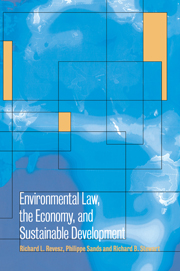 Environmental Law, the Economy and Sustainable Development
Environmental Law, the Economy and Sustainable Development Book contents
- Frontmatter
- Contents
- List of contributors
- Introduction: environmental regulation in multi-jurisdictional regimes
- PART I ENVIRONMENTAL REGULATION IN FEDERAL SYSTEMS
- PART II ENVIRONMENTAL REGULATION AND INTERNATIONAL TRADE
- 4 Environmental protection and the global trade order
- 5 International trade law and international environmental law: environmental taxes and border tax adjustment in WTO law and EC law
- 6 “Environmental protection and the global trade order”: a different perspective
- PART III CHOICE OF ENVIRONMENTAL POLICY INSTRUMENTS
- PART IV THE ENVIRONMENTAL STANDARD - SETTING PROCESS
- PART V INTERNATIONAL ENVIRONMENTAL LAW AND SUSTAINABLE DEVELOPMENT
- Index
5 - International trade law and international environmental law: environmental taxes and border tax adjustment in WTO law and EC law
Published online by Cambridge University Press: 03 May 2010
- Frontmatter
- Contents
- List of contributors
- Introduction: environmental regulation in multi-jurisdictional regimes
- PART I ENVIRONMENTAL REGULATION IN FEDERAL SYSTEMS
- PART II ENVIRONMENTAL REGULATION AND INTERNATIONAL TRADE
- 4 Environmental protection and the global trade order
- 5 International trade law and international environmental law: environmental taxes and border tax adjustment in WTO law and EC law
- 6 “Environmental protection and the global trade order”: a different perspective
- PART III CHOICE OF ENVIRONMENTAL POLICY INSTRUMENTS
- PART IV THE ENVIRONMENTAL STANDARD - SETTING PROCESS
- PART V INTERNATIONAL ENVIRONMENTAL LAW AND SUSTAINABLE DEVELOPMENT
- Index
Summary
Professor Roessler's paper purports to “explore the systemic, legal, and institutional consequences of linking trade and non-trade issues in the framework of the WTO, taking the proposed linkages between environment and trade as an example.” The first section of this comment on Prof. Roessler's paper addresses briefly the four conclusions reached by Roessler. The second section draws attention to additional “interface problems,” notably advantages and problems of environmental taxes. The third section elaborates on the second conclusion of Roessler, i.e. that the WTO's border adjustment rules should not be changed, by analyzing in more detail the interrelationships between environmental taxes and border tax adjustment in the worldwide context of GATT and WTO law. The final section compares the worldwide GATT/WTO rules on border tax adjustment and tax discrimination with the corresponding rules and experiences in the regional context of EC law, and draws some tentative conclusions.
Professor Roessler's four main conclusions
CONSISTENCY OF WTO LAW WITH EFFICIENT ENVIRONMENTAL POLICIES
Roessler's first conclusion is that there is in principle no conflict between WTO law and the efficient pursuit of a domestic environmental policy objective so that there does not seem to be a need for exempting domestic environmental policies from WTO obligations. This view is widely shared today in environmental economics and among governments. As most environmental pollution arises at the level of production, distribution, consumption, or disposal of goods and services, efficient environmental policies should intervene directly at the source of the pollution, i.e. at the production, distribution, consumption, or waste disposal level rather than at the trade level where trade policy interventions risk causing welfarereducing “by-product distortions.”
- Type
- Chapter
- Information
- Environmental Law, the Economy and Sustainable DevelopmentThe United States, the European Union and the International Community, pp. 127 - 155Publisher: Cambridge University PressPrint publication year: 2000
- 2
- Cited by
